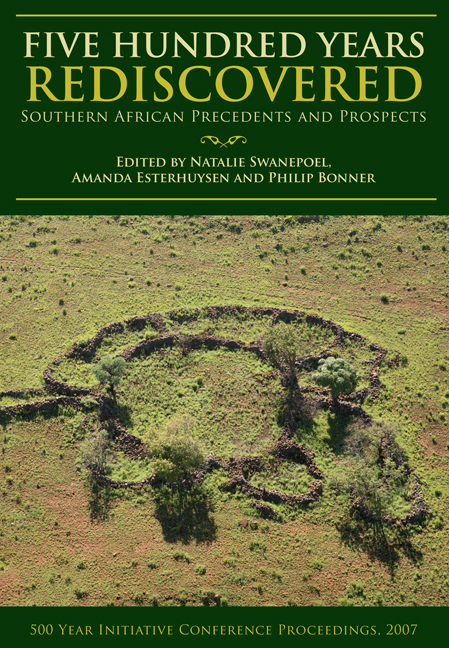Book contents
- Frontmatter
- Contents
- Preface
- 1 Introduction
- Section 1 Disciplinary Identities: Methodological Considerations
- 2 Historical archaeologies of southern Africa: precedents and prospects
- 3 South Africa in Africa more than five hundred years ago: some questions
- 4 Towards an outline of the oral geography, historical identity and political economy of the Late Precolonial Tswana in the Rustenburg region
- 5 Metals beyond frontiers: exploring the production, distribution and use of metals in the Free State grasslands, South Africa
- 6 deTuin, a 19th-century mission station in the Northern Cape
- 7 Reinterpreting the origins of Dzata: archaeology and legends
- Section 2 Material Identities
- Section 3 ‘Troubled Times’: Warfare, State Formation and Migration in the Interior
- List of contributors
- Index
2 - Historical archaeologies of southern Africa: precedents and prospects
from Section 1 - Disciplinary Identities: Methodological Considerations
Published online by Cambridge University Press: 30 May 2019
- Frontmatter
- Contents
- Preface
- 1 Introduction
- Section 1 Disciplinary Identities: Methodological Considerations
- 2 Historical archaeologies of southern Africa: precedents and prospects
- 3 South Africa in Africa more than five hundred years ago: some questions
- 4 Towards an outline of the oral geography, historical identity and political economy of the Late Precolonial Tswana in the Rustenburg region
- 5 Metals beyond frontiers: exploring the production, distribution and use of metals in the Free State grasslands, South Africa
- 6 deTuin, a 19th-century mission station in the Northern Cape
- 7 Reinterpreting the origins of Dzata: archaeology and legends
- Section 2 Material Identities
- Section 3 ‘Troubled Times’: Warfare, State Formation and Migration in the Interior
- List of contributors
- Index
Summary
Introduction
The Five Hundred Year Initiative (FYI) has set an important and ambitious agenda: to reinterrogate the last 500 years in order to generate a more comprehensive understanding of modern South Africa(ns) (FYI mission statement 2007). The project has grown, at least in part, from a frustration with the current state of research where a general lack of interdisciplinary vision and co-operation has resulted in the circumscribed use of documentary, oral and material records with an accompanying lack of integration and historical depth. The effort to reconnect these erstwhile disparate sources into a coherent intellectual agenda envisages ‘historical archaeology’ as a capacitating framework. This is perhaps unsurprising. Archaeology has always been a multidisciplinary subject and such tendencies are well pronounced in the field of historical archaeology where inspiration, analytical methods and intellectual vision straddle the traditional limits of a number of disciplines, most obviously history and archaeology.
The call for a ‘new agenda’ in the (historical) archaeology of southern Africa's last 500 years mandates a rearticulation of traditionally discrete sub-disciplines within archaeology and the forging of new kinds of partnerships and co-operations with sister disciplines, particularly history and anthropology. Local understandings and practice are poised for change in a collective effort that will recontour the landscape of enquiry. At the outset it is perhaps important to note that such collaborative endeavours do not require the surrender of specific strengths, only a more expansive and contemplative intellectual positioning. Historical archaeological practitioners typically must navigate between and within different kinds of sources, including written and oral accounts and pictorial representations, but we remain ultimately grounded in the materiality of primary source materials that encompass cultural landscapes, the built environment, spatial organisation, artefacts, ecofacts, and the ways in which these change over space and through time (Hicks 2003: 315). Archaeology does not, therefore, play a supplementary role in the larger project of ‘history’. Indeed, as Sarah Tarlow (2007) has pointed out, the study of the material world has as much to offer to understandings of the past as a study of texts – a fact admirably demonstrated by generations of architectural and art historians (who, after all, are seldom moved to justify their enquiries).
- Type
- Chapter
- Information
- Five Hundred Years RediscoveredSouthern African precedents and prospects, pp. 23 - 40Publisher: Wits University PressPrint publication year: 2008



